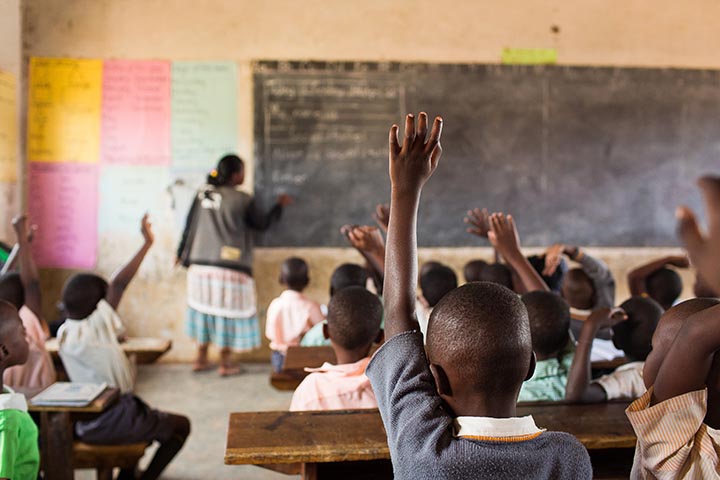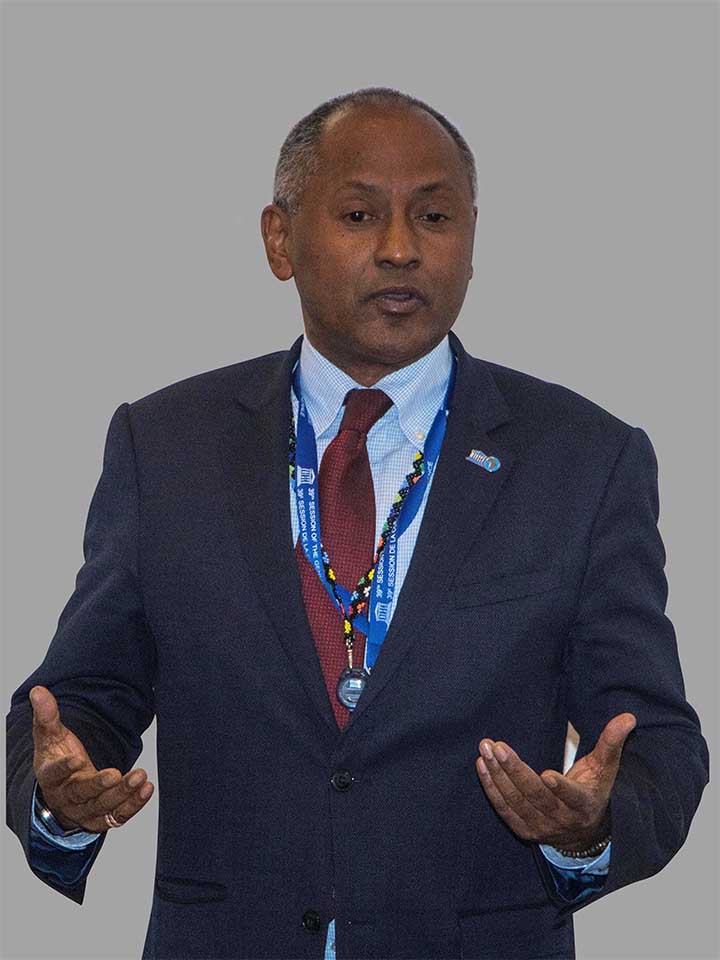Fostering Sustainable Development in Africa through ICT
This site uses cookies. By continuing to browse the site you are agreeing to our use of cookies. Read our privacy policy>
![]()
Produits, solutions et services pour les entreprises

Reading guide: The African Union is working toward its goal of transforming its economic fortunes by 2063. The use of Information and Communications Technology (ICT) will be integral to achieving that objective, and it will be enabled by partnerships with leading enterprises.
In September 2015, 193 world leaders committed on 17 Sustainable Development Goals (SDGs) to end extreme poverty, tackle inequality and injustice, and protect the planet by 2030. Education (SDG 4), as the most transformative goal of all, has set to ensure 12 years of quality education for all children and lifelong learning opportunities for all by 2030. More ambitious than any that has preceded it, SDG 4 also calls for more innovative and wide-reaching approaches. ICT thus emerged to be an indispensable tool that carries enormous power to be able to meet the scope of the SDG 4 vision.
In the increasingly digitalized world, we can no longer conceive education without technology and innovation — this is particularly true in what we have witnessed during the COVID-19 pandemic. Before the global pandemic, the proportion of children and youth out of primary and secondary school had declined from 26% in 2000 to 17% in 2018. However, the global pandemic threatens to jeopardize these hard-won gains in the global education sector, especially for the most vulnerable and marginalized and those in the low-income countries. By April 2020, closures of schools and other educational institutions have affected over 1.57 billion learners, constituting 90% of the world's total enrolled student population. School closures were necessary measures to curtail the health emergency, but they have precipitated a global learning crisis. Responses from around the globe converged toward the establishment of tech-enabled platforms and modalities, all aiming to ensure that learning does not stop.
Today, as the world is recovering from the unprecedented crisis, important lessons have been drawn locally and internationally, on how to integrate ICT and innovation in education. Better and more coherent strategies are required in this respect in order to regain the momentum and achieve SDG 4 in the next 10 years.
A public health emergency at its onset, the pandemic has snowballed into a global crisis that tests the prospects of the young generation, especially for those who are already socially and economically disadvantaged. The global pandemic has exposed the global digital divide. It is even more pronounced in the domain of education and affects disproportionately certain parts of the world. For example, in sub-Saharan Africa, at the height of school closures, 89% of learners did not have access to household computers and 82% lacked Internet access. While cellphones can enable learners' access to information, connect with one another, about 56 million learners live in locations not served by mobile networks, among whom half are in sub-Saharan Africa. The lack of digital skills of teachers and parents is also hindering governments' responses in ensuring the continuity of learning. Across sub-Saharan Africa, only 64% of primary and 50% of secondary teachers have received only minimum training, and this frequently does not include ICT skills.
Most of the world has been enjoying the benefits of the advancement of technologies, but technological progress has yet to become a shared common good for all humanity. The digital divide spans across all segments of our societies, between the youth and the elderly, between men and women, and between city-dwellers and rural populations. For instance, today, still some 327 million fewer women than men have a smartphone and can access the mobile Internet. Women are also under-represented, among others, in sciences, the ICT industry, and in start-up companies. The gender gap in technologies has therefore called for policymakers and development partners, such as UNESCO, to place gender-responsive actions and girls' and women's engagement in Science, Technology, Engineering, and Mathematics (STEM) a priority.
Even before the arrival of the 'new normal,' our lives were scripted around connectivity — interacting with our loved ones remotely, accessing distance education, culture, and information, and subsequently equipping people with digital skills to carry out these tasks, especially teachers, workers, and the youth. At a time when society has to respond to the rapid changes in everyday life and the labor market in the face of 'the fourth industrial revolution,' we must build the most innovative and efficient talent development system to live up to this challenge, that of quality and access.
To keep our talent ecosystem abreast with the socio-economic transformation, all stakeholders should join hands in delivering a holistic approach to build the technical and scientific capacity and construct a favorable environment for youth and innovation. UNESCO, within its mandate, has been building the continuum of skills as well as the policy structures throughout the entire education system. From showcasing microsciences kits at schools to drafting policy advice for its member states, the wide range of activities bring together diverse partners under the shared vision to create a critical mass of scientists, engineers, and researchers for the country's transformation.
In the knowledge-intensive societies, academy-industry linkages prove to be vital to the industrial, economic, and social transformation driven by science and technology. The academic institutions can benefit from the cooperation to cultivate more employable graduates; meanwhile, for the private sectors, partnering with academic institutions is a great way to learn about the needs and opportunities of certain markets. For policymakers, it is increasingly important to support education institutions as strategic actors in national and regional economic development, given their potential to upgrade knowledge of the labor force and to contribute to the process of technology transfer.
With a wide mandate, covering education, science, culture, and communication and information, UNESCO is committed to making digital technology a tool for progress in all its fields of competence. Thanks to its partnerships with industry leaders such as Huawei, the organization is working toward linking educational institutions with private partners. In March 2020, UNESCO launched the Global Education Coalition to respond to the education crisis during the COVID-19 pandemic, which gathered more than 140 members from the UN family, civil society, academia, and the private sector. Through this platform for exchange and collaboration, the linkage between academia and industries have been strengthened significantly, the legacy of which will be carried on and replicated in a wider range of education activities, such as in Technical and Vocational Education and Training (TVET) and Science, Technology Engineering, and Mathematics (STEM) education, in the years to come.
With more than 60% of its population under the age of 25, sub-Saharan Africa is the world's youngest region. By 2030, the continent's working-age population is set to increase to over 600 million. The world must match today's skills with tomorrow's needs — this is especially urgent for the young generation in Africa who will lead its transformation and tackle challenges of this century, such as climate change, peace and security, and inclusive development.
Technologies have already become part of people's lives in Africa, whether it's people using the M-Pesa mobile money service to buy food on local markets or the booming start-up scenes that have attracted billions of dollars of investments. From Nigeria to Kenya, and Rwanda to Ghana, technology innovation has been tapping into various sectors: energy, agriculture, finance, healthcare, entertainment, transportation, and so on. ICT will continue to be employed to solve long-standing African socio-economic issues, and the youth will lead this technological revolution.
Despite the rapid improvement in its connectivity, the significant gaps between different countries and regions remind us of the uphill journey lying ahead of us. The African continent is a bearer of enormous potential, but also of multifaceted challenges such as instabilities, civil strife, and uncontrolled development. It has thus brought policymakers and businesses to ask themselves this important question: In this increasingly globalized and digitalized world, how do we navigate through the complexities to pave a path for this growing youth population?
In 2015, the 55 member states of the African Union adopted the Agenda 2063: The Africa We Want, a blueprint and master plan for transforming Africa into the global powerhouse of the future in half of a century. The continent is thus poised to empower the youth and bridge the digital divide to drive its transformation agenda by creating innovative solutions. As articulated in Agenda 2063, one of its aims is to change global contexts such as increased globalization and the ICT revolution.
Meanwhile, partners like Huawei and UNESCO are united under the shared mission of fostering the digital skills of African youth, technology innovation, and entrepreneurship, through the implementation of various programs across the continent. It is more critical now than ever to engage private partners to develop the digital talent ecosystem to prepare for the transformation that the continent has foreseen for itself. As we embark on a new decade of action for global common good, each one of us has a key role to play in the global actions to make digital technology truly inclusive and beneficial for all.
(Based on the keynote speech on Huawei ICT Competition by Firmin Edouard Matoko, the Assistant Director-General for Priority Africa and External Relations of UNESCO)

Pull quote:
UNESCO is committed to making digital technology a tool for progress in all its fields of competence. Thanks to its partnerships with industry leaders such as Huawei, the organization is working toward linking educational institutions with private partners.
—Firmin Edouard Matoko, the Assistant Director-General for Priority Africa and External Relations of UNESCO